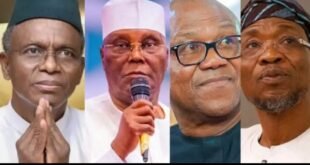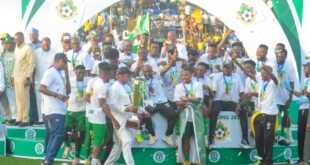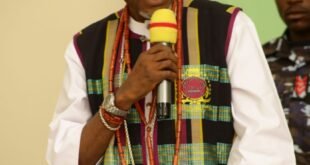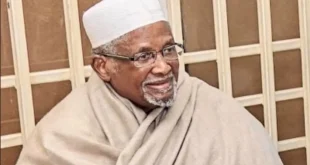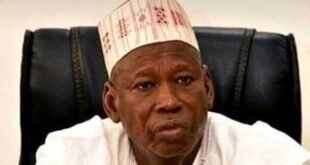Venezuelan President Nicolás Maduro and his political opponents both claimed victory in Monday’s presidential election, while the United States and several regional nations expressed skepticism about the official results awarding victory to the dictatorial leader.
With 80% of the votes counted, Maduro obtained more than 51% of the vote, surpassing the candidate of the United Democratic Platform (PUD) Edmundo González Urrutia, who obtained more than 44%, according to a statement from the National Electoral Council (CNE).
But the opposition painted a very different picture of the results. Opposition leader María Corina Machado said at a press conference that their own records showed their candidate Edmundo González Urrutia had received 70 percent of the vote to Maduro’s 30 percent.
“We won and everyone knows it,” Machado said, adding that the opposition “will defend the truth.”
“The entire international community knows what happened in Venezuela and how people voted for change,” he said.
Opposition protesters in Maracay, Venezuela.
If Maduro were to take office, it would be for a third consecutive six-year term, representing the continuity of the “Chavismo” in power, which began in 1999 at the hands of former President Hugo Chávez. Maduro has been in power since Chávez’s death in 2013.
The vote came at a crucial time for Venezuela, an oil-rich nation that has suffered the worst peacetime economic collapse in recent history. Maduro has blamed foreign sanctions against his regime, saying Venezuela is the victim of an “economic war.”
Meanwhile, the opposition, galvanized in this election cycle and posing the most significant threat to Maduro’s grip on power in years, has vowed to restore democracy in Venezuela and rebuild the economy if it wins.
Throughout the electoral process, concerns have grown that the opposition will not see a fair contest, as Maduro’s government controls all public institutions in Venezuela, including the Supreme Court, which could be the final arbiter on any allegations of electoral fraud. The government has also been accused of rigging votes in the past, which it has denied.
Tears and celebrations
Voters turned out in droves, with many saying they would leave the country if Maduro won, pointing to the violent repression and economic collapse that have occurred under his rule.
After the results were announced, Maduro described them as a “triumph of peace, stability, republican ideals and ideas of equality.”
“They have not been able to overcome the sanctions, they have not been able to overcome the aggressions, the threats, they have not been able and will never be able to overcome the dignity of the Venezuelan people,” he said during his public speech, referring to his political opponents.
The results announced by electoral authorities were met with mixed emotions in the capital Caracas, with Maduro supporters cheering and celebrating outside the president’s official residence. Meanwhile, opposition supporters were seen crying and hugging in the streets.
Voters consult voter lists before the opening of polls for the presidential election in Caracas, Venezuela, Sunday, July 28, 2024.
Opposition leaders said Sunday night that there had been irregularities in the election, including denying opposition witnesses access to the CNE headquarters while the authority counted votes and blocking the sending of data from local polling stations to the CNE headquarters to prevent further votes from being processed.
The run-up to the vote was also marred by accusations of foul play.
According to the human rights organization Laboratorio de Paz, at least 71 people were arbitrarily arrested during the election campaign, most of whom provided some kind of service to the opposition, and a dozen online media outlets were blocked in the country.
The government has also created significant obstacles for Venezuelans abroad to vote, including largely unattainable passport and residency requirements.
CNN contacted the CNE, which did not respond to the opposition’s accusations.
‘Serious concerns’
After the CNE announced Maduro’s victory, US Secretary of State Antony Blinken expressed “serious concerns that the announced result does not reflect the will or the votes of the Venezuelan people.”
He added that it was “essential” that votes were counted fairly and transparently and called on the CNE to publish its vote tables.
The opposition’s accusations could cast doubt on Venezuela’s return to the international stage, after Maduro last year pledged to hold free and fair elections in U.S.-brokered talks in exchange for the lifting of sanctions.
The results also prompted mixed reactions across the region. The presidents of Peru, Chile, Guatemala, Costa Rica, Argentina and Uruguay all denounced or questioned the results, with many saying they would not recognize Maduro’s victory. Before the election, many Latin American leaders had urged Maduro to pledge to step down if he lost.
But some of Venezuela’s partners congratulated Maduro on his victory, including the presidents of Bolivia, Honduras and Cuba.
On Sunday evening, a government statement shared online by Venezuela’s foreign minister condemned what it called a foreign “intervention” against the election, pointing the finger at a number of countries that had criticized the results, including Argentina, Paraguay, Costa Rica, Ecuador, Guatemala, Peru and others.
[CNN]The post Both Venezuelan dictator Nicolas Maduro and opposition claim election victory, as US expresses ‘serious concerns’ appeared first on TheConclaveNg.
 JamzNG Latest News, Gist, Entertainment in Nigeria
JamzNG Latest News, Gist, Entertainment in Nigeria

